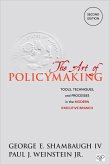- Broschiertes Buch
- Merkliste
- Auf die Merkliste
- Bewerten Bewerten
- Teilen
- Produkt teilen
- Produkterinnerung
- Produkterinnerung
Politics in Europe introduces students to the power of the EU and seven political systems-the UK, France, Germany, Italy, Sweden, Russia, and Poland-while addressing key social and political issues including globalization, terrorism, immigration, gender, and religion. Packed with robust country descriptions from regional specialists, the Eighth Edition encourages critical thinking and meaningful cross-national comparisons.
Andere Kunden interessierten sich auch für
![Working with Political Science Research Methods Working with Political Science Research Methods]() Jason D. MycoffWorking with Political Science Research Methods81,99 €
Jason D. MycoffWorking with Political Science Research Methods81,99 €![The Global Environment The Global Environment]() The Global Environment110,99 €
The Global Environment110,99 €![Propensity Score Analysis Propensity Score Analysis]() Shenyang GuoPropensity Score Analysis162,99 €
Shenyang GuoPropensity Score Analysis162,99 €![Understanding Terrorism Understanding Terrorism]() Gus MartinUnderstanding Terrorism192,99 €
Gus MartinUnderstanding Terrorism192,99 €![The Art of Policymaking The Art of Policymaking]() George ShambaughThe Art of Policymaking80,99 €
George ShambaughThe Art of Policymaking80,99 €![The Art of Policymaking The Art of Policymaking]() George ShambaughThe Art of Policymaking80,99 €
George ShambaughThe Art of Policymaking80,99 €![American Intergovernmental Relations American Intergovernmental Relations]() American Intergovernmental Relations192,99 €
American Intergovernmental Relations192,99 €-
-
-
Politics in Europe introduces students to the power of the EU and seven political systems-the UK, France, Germany, Italy, Sweden, Russia, and Poland-while addressing key social and political issues including globalization, terrorism, immigration, gender, and religion. Packed with robust country descriptions from regional specialists, the Eighth Edition encourages critical thinking and meaningful cross-national comparisons.
Hinweis: Dieser Artikel kann nur an eine deutsche Lieferadresse ausgeliefert werden.
Hinweis: Dieser Artikel kann nur an eine deutsche Lieferadresse ausgeliefert werden.
Produktdetails
- Produktdetails
- Verlag: SAGE Publications Inc
- 8 Revised edition
- Seitenzahl: 872
- Erscheinungstermin: 25. März 2024
- Englisch
- Abmessung: 186mm x 232mm x 51mm
- Gewicht: 1540g
- ISBN-13: 9781071844298
- ISBN-10: 1071844296
- Artikelnr.: 69311018
- Herstellerkennzeichnung
- Libri GmbH
- Europaallee 1
- 36244 Bad Hersfeld
- gpsr@libri.de
- Verlag: SAGE Publications Inc
- 8 Revised edition
- Seitenzahl: 872
- Erscheinungstermin: 25. März 2024
- Englisch
- Abmessung: 186mm x 232mm x 51mm
- Gewicht: 1540g
- ISBN-13: 9781071844298
- ISBN-10: 1071844296
- Artikelnr.: 69311018
- Herstellerkennzeichnung
- Libri GmbH
- Europaallee 1
- 36244 Bad Hersfeld
- gpsr@libri.de
M. Donald Hancock is professor emeritus of political science at Vanderbilt University. He has previously taught at Columbia University, the University of Texas (UT) at Austin, and the universities of Bielefeld and Mannheim in Germany. Hancock is the founding director of two centers for European Studies-the first at UT Austin and the second, founded in 1981, at Vanderbilt. The latter is now designated the Max Kade Center for European and German Studies (which Hancock has also served as associate director for outreach activities). He is the coauthor (with Henry Krisch) of Politics in Germany (2009), and co-editor and coauthor of Transitions to Capitalism and Democracy in Russia and Central Europe (2000), German Unification: Process and Outcomes (1994), and Managing Modern Capitalism: Industrial Renewal and Workplace Democracy in the United States and Western Europe (1991). Hancock has served as co-chair of the Council for European Studies and as president of the Society for the Advancement of Scandinavian Studies and the Conference Group on German Politics. He is currently working on a collaborative study of economic, societal, and military security in the Baltic region.
Introduction
1. United Kingdom, by Christopher J. Carman and Alan Convery
1.1 The Context of British Politics in the United Kingdom
1.2 Where Is the Power in the United Kingdom?
1.3 Who Has the Power in the United Kingdom?
1.4 How Is Power Used in the United Kingdom?
1.5 What Is the Future of UK Politics?
2. France, by Michelle Hale Williams
2.1 The Context of French Politics
2.2 Where Is the Power in France?
2.3 Who Has the Power in France?
2.4 How Is Power Used in France?
2.5 What Is the Future of French Politics?
3. Germany, by David P. Conradt
3.1 The Context of German Politics
3.2 Where Is the Power in Germany?
3.3 Who Has the Power in Germany?
3.4 How Is Power Used in Germany?
3.5 What Is the Future of German Politics?
4. Italy, by Raffaella Y. Nanetti and Robert Leonardi
4.1 The Context of Italian Politics
4.2 Where Is the Power in Italy?
4.3 Who Has the Power in Italy?
4.4 How Is Power Used in Italy?
4.5 What Is the Future of Italian Politics?
5. Sweden, by Jan Teorell
5.1 The Context of Swedish Politics
5.2 Where Is the Power in Sweden?
5.3 Who Has the Power in Sweden?
5.4 How Is Power Used in Sweden?
5.5 What Is the Future of Swedish Politics?
6. Poland
6.1 The Context of Polish Politics
6.2 Where Is the Power in Poland?
6.3 Who Has the Power in Poland?
6.4 How Is Power Used in Poland?
6.5 What Is the Future of Polish Politics?
7. Russia
7.1 The Context of Russian Politics
7.2 Where Is the Power in Russia?
7.3 Who Has the Power in Russia?
7.4 How Is Power Used in Russia?
7.5 What Is the Future of Russian Politics?
8. European Union Politics
8.1 The Context of European Union Politics
8.2 Where Is the Power in the EU?
8.3 Who Has the Power in the EU?
8.4 How Is Power Used in the EU?
8.5 What Is the Future of EU Politics?
1. United Kingdom, by Christopher J. Carman and Alan Convery
1.1 The Context of British Politics in the United Kingdom
1.2 Where Is the Power in the United Kingdom?
1.3 Who Has the Power in the United Kingdom?
1.4 How Is Power Used in the United Kingdom?
1.5 What Is the Future of UK Politics?
2. France, by Michelle Hale Williams
2.1 The Context of French Politics
2.2 Where Is the Power in France?
2.3 Who Has the Power in France?
2.4 How Is Power Used in France?
2.5 What Is the Future of French Politics?
3. Germany, by David P. Conradt
3.1 The Context of German Politics
3.2 Where Is the Power in Germany?
3.3 Who Has the Power in Germany?
3.4 How Is Power Used in Germany?
3.5 What Is the Future of German Politics?
4. Italy, by Raffaella Y. Nanetti and Robert Leonardi
4.1 The Context of Italian Politics
4.2 Where Is the Power in Italy?
4.3 Who Has the Power in Italy?
4.4 How Is Power Used in Italy?
4.5 What Is the Future of Italian Politics?
5. Sweden, by Jan Teorell
5.1 The Context of Swedish Politics
5.2 Where Is the Power in Sweden?
5.3 Who Has the Power in Sweden?
5.4 How Is Power Used in Sweden?
5.5 What Is the Future of Swedish Politics?
6. Poland
6.1 The Context of Polish Politics
6.2 Where Is the Power in Poland?
6.3 Who Has the Power in Poland?
6.4 How Is Power Used in Poland?
6.5 What Is the Future of Polish Politics?
7. Russia
7.1 The Context of Russian Politics
7.2 Where Is the Power in Russia?
7.3 Who Has the Power in Russia?
7.4 How Is Power Used in Russia?
7.5 What Is the Future of Russian Politics?
8. European Union Politics
8.1 The Context of European Union Politics
8.2 Where Is the Power in the EU?
8.3 Who Has the Power in the EU?
8.4 How Is Power Used in the EU?
8.5 What Is the Future of EU Politics?
Introduction
1. United Kingdom, by Christopher J. Carman and Alan Convery
1.1 The Context of British Politics in the United Kingdom
1.2 Where Is the Power in the United Kingdom?
1.3 Who Has the Power in the United Kingdom?
1.4 How Is Power Used in the United Kingdom?
1.5 What Is the Future of UK Politics?
2. France, by Michelle Hale Williams
2.1 The Context of French Politics
2.2 Where Is the Power in France?
2.3 Who Has the Power in France?
2.4 How Is Power Used in France?
2.5 What Is the Future of French Politics?
3. Germany, by David P. Conradt
3.1 The Context of German Politics
3.2 Where Is the Power in Germany?
3.3 Who Has the Power in Germany?
3.4 How Is Power Used in Germany?
3.5 What Is the Future of German Politics?
4. Italy, by Raffaella Y. Nanetti and Robert Leonardi
4.1 The Context of Italian Politics
4.2 Where Is the Power in Italy?
4.3 Who Has the Power in Italy?
4.4 How Is Power Used in Italy?
4.5 What Is the Future of Italian Politics?
5. Sweden, by Jan Teorell
5.1 The Context of Swedish Politics
5.2 Where Is the Power in Sweden?
5.3 Who Has the Power in Sweden?
5.4 How Is Power Used in Sweden?
5.5 What Is the Future of Swedish Politics?
6. Poland
6.1 The Context of Polish Politics
6.2 Where Is the Power in Poland?
6.3 Who Has the Power in Poland?
6.4 How Is Power Used in Poland?
6.5 What Is the Future of Polish Politics?
7. Russia
7.1 The Context of Russian Politics
7.2 Where Is the Power in Russia?
7.3 Who Has the Power in Russia?
7.4 How Is Power Used in Russia?
7.5 What Is the Future of Russian Politics?
8. European Union Politics
8.1 The Context of European Union Politics
8.2 Where Is the Power in the EU?
8.3 Who Has the Power in the EU?
8.4 How Is Power Used in the EU?
8.5 What Is the Future of EU Politics?
1. United Kingdom, by Christopher J. Carman and Alan Convery
1.1 The Context of British Politics in the United Kingdom
1.2 Where Is the Power in the United Kingdom?
1.3 Who Has the Power in the United Kingdom?
1.4 How Is Power Used in the United Kingdom?
1.5 What Is the Future of UK Politics?
2. France, by Michelle Hale Williams
2.1 The Context of French Politics
2.2 Where Is the Power in France?
2.3 Who Has the Power in France?
2.4 How Is Power Used in France?
2.5 What Is the Future of French Politics?
3. Germany, by David P. Conradt
3.1 The Context of German Politics
3.2 Where Is the Power in Germany?
3.3 Who Has the Power in Germany?
3.4 How Is Power Used in Germany?
3.5 What Is the Future of German Politics?
4. Italy, by Raffaella Y. Nanetti and Robert Leonardi
4.1 The Context of Italian Politics
4.2 Where Is the Power in Italy?
4.3 Who Has the Power in Italy?
4.4 How Is Power Used in Italy?
4.5 What Is the Future of Italian Politics?
5. Sweden, by Jan Teorell
5.1 The Context of Swedish Politics
5.2 Where Is the Power in Sweden?
5.3 Who Has the Power in Sweden?
5.4 How Is Power Used in Sweden?
5.5 What Is the Future of Swedish Politics?
6. Poland
6.1 The Context of Polish Politics
6.2 Where Is the Power in Poland?
6.3 Who Has the Power in Poland?
6.4 How Is Power Used in Poland?
6.5 What Is the Future of Polish Politics?
7. Russia
7.1 The Context of Russian Politics
7.2 Where Is the Power in Russia?
7.3 Who Has the Power in Russia?
7.4 How Is Power Used in Russia?
7.5 What Is the Future of Russian Politics?
8. European Union Politics
8.1 The Context of European Union Politics
8.2 Where Is the Power in the EU?
8.3 Who Has the Power in the EU?
8.4 How Is Power Used in the EU?
8.5 What Is the Future of EU Politics?








